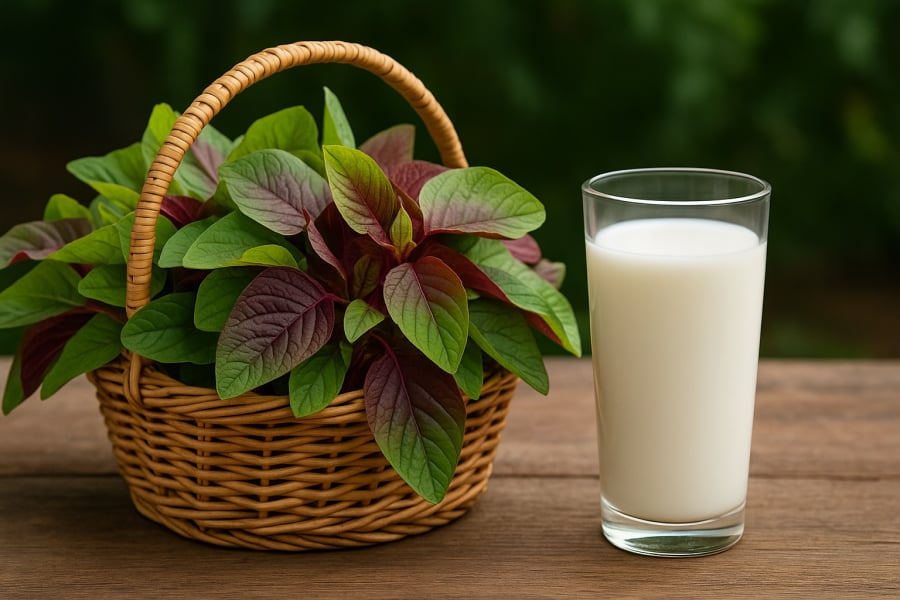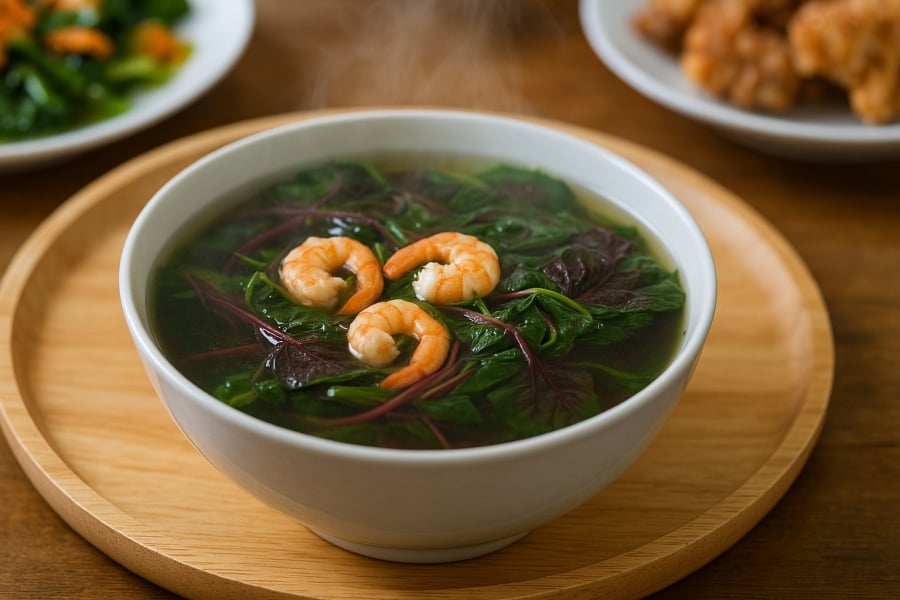Amaranth: The Unsung Calcium-rich Vegetable
Amaranth is a vegetable powerhouse, packing a whopping 267mg of calcium per 100g. To put that into perspective, that’s more than double the amount found in the same quantity of fresh milk. What makes amaranth even more remarkable is that its calcium is easily absorbed by the body thanks to the presence of vitamin K and natural magnesium in its leaves.
Not only is amaranth beneficial for bone health, but it also helps reduce the risk of osteoporosis in middle-aged women and the elderly—individuals who are more prone to calcium deficiency over time. This is excellent news for those who cannot tolerate dairy or have lactose intolerance. With amaranth, you can effectively boost your calcium intake through simple, everyday meals.
A Heart-healthy Vegetable That Shouldn’t Be Underestimated
The fiber in amaranth not only promotes a healthy digestive system but also plays a role in lowering “bad” LDL cholesterol levels in the blood. Additionally, tocotrienol, a form of vitamin E found in this vegetable, has been shown to inhibit cholesterol formation, thereby aiding in the prevention of cardiovascular disease.
Amaranth is also rich in potassium and magnesium, two essential minerals that help dilate blood vessels, regulate blood pressure, and improve blood circulation. For those looking to manage their blood pressure or with a history of heart disease, amaranth is a safe and wholesome addition to their diet.

Helps Regulate Blood Sugar and Is Ideal for Dieters
Amaranth has a low glycemic index and is packed with soluble fiber. This fiber slows down the absorption of sugar into the bloodstream, helping to maintain stable blood sugar levels after meals. Those on a weight loss journey or managing type 2 diabetes can include amaranth as part of their daily diet.
Additionally, amaranth creates a prolonged feeling of fullness without spiking blood sugar levels, making it a useful tool for portion control—an essential aspect of weight management.
A Powerful Antioxidant That May Help Prevent Cancer
Scientific research has revealed that amaranth is abundant in antioxidants such as anthocyanin, flavonoids, and phenolic acids. These compounds protect cells from the damaging effects of free radicals, which are known to cause premature aging and contribute to the development of serious diseases, including cancer.
Extracts from amaranth have also been shown to inhibit the growth of certain cancer cells in laboratory conditions, particularly liver cancer. While it cannot replace medication, amaranth may serve as a natural shield, helping to prevent disease through a healthy diet.
Rich in Iron and Vitamins for Blood Enrichment and Skin Health
Another often overlooked benefit of amaranth is its high iron content—a crucial mineral in blood formation. Amaranth contains 5.4mg of iron per 100g, surpassing the levels found in some red meats. Combined with natural vitamin C, which enhances iron absorption, amaranth becomes an excellent blood-enriching food for women, who are more prone to iron deficiency due to physiological factors.
Furthermore, amaranth is a source of vitamins A, C, and E—all of which contribute to healthy, glowing skin. For those seeking natural skincare solutions, amaranth is a wonderful gift from Mother Nature.

Eating Amaranth the Right Way for Optimal Health Benefits
Despite its numerous benefits, there are a few considerations to keep in mind when consuming amaranth:
- Cooling properties: Amaranth has cooling properties, so individuals with diarrhea or weak digestion should avoid consuming excessive amounts.
- High oxalate content: Oxalates can contribute to kidney stone formation if consumed in large quantities, especially for those with a history of kidney stones.
- Avoid reheating: Amaranth contains nitrates, which can convert to nitrites—which are not beneficial for health—if the vegetable is stored for too long or reheated multiple times.
- Don’t pair with calcium-rich foods: Combining amaranth with dairy or other calcium-rich foods can lead to the formation of calcium oxalate precipitates, hindering absorption and potentially increasing the risk of kidney stones.
It is best to consume fresh amaranth, cooked just right, and within the same day, without storing it overnight.
Conclusion
While many spend a fortune on calcium supplements and anti-aging products, amaranth—a humble and affordable vegetable—offers all these nutritional benefits and more. From strengthening bones and protecting cardiovascular health to potentially preventing cancer, amaranth deserves to be the unsung hero of every meal.
Let’s appreciate the simple things in life—sometimes, it’s the unassuming bunch of amaranth from Mom’s garden that brings the greatest gifts to our health.
































